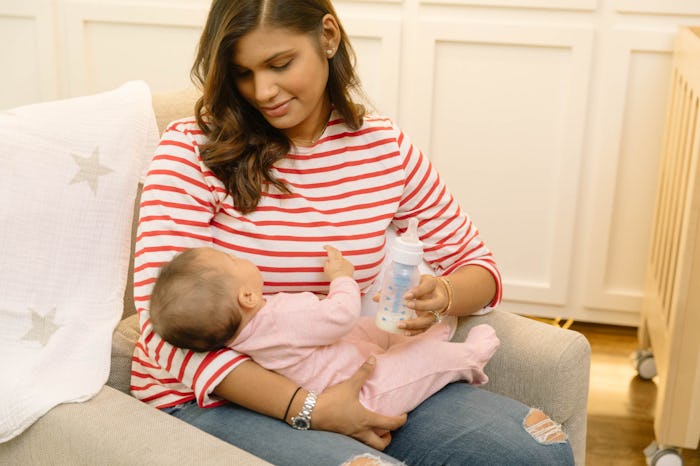Life
Here's How Long It Takes For Your Hormones To Settle Back Down After Pregnancy
The roller coaster hormones that come with pregnancy can have you weeping one minute and the next feeling fiery rage about your husband's stray sock in the middle of the bedroom floor. (Not that I would know anything about that.) But guess what? The arrival of your little one does not mean the dissipation of fluctuating hormones. In fact, I felt like the ups and downs were way harsher following the birth of my daughter. But how long does it take for your hormones to regulate after pregnancy? And when will you stop being such a sweaty, hot flash-y, exhausted mess of emotions?
"Usually, if there are no outside factors, hormones should return to normal six to eight weeks after delivery, starting with a normal period," Dr. Lakeisha Richardson, a board-certified OB-GYN tells Romper in an email interview. "Hormones may return to normal earlier for women who start birth control immediately after delivery. But, for women who are breastfeeding, their hormones will not return to normal until they decrease or stop breastfeeding."
According to Hotze Health, the postpartum hormone imbalance is the result of something known as estrogen dominance. The culprit? For starters, the placenta produces high levels of progesterone during pregnancy that are much higher than your normal production rate. "Upon the birth of the baby, the placenta is expelled, resulting in an immediate drop in a woman’s progesterone level," the site noted. In other words, hello estrogen in overdrive. The result is hair loss, fatigue, depression and anxiety, and menstrual problems. Woohoo. Your plummeting progesterone level is also typically the cause of the "baby blues" most women experience.
Also on your body's agenda? Possible back pain, skin discolorations, more things coming out of your vagina (discharge and/or blood), breast changes and constipation, according to Parents. The good news is that eventually your body finds a way to even out all of the changes. The bad news is you have to endure it while learning the ins and outs of raising a tiny human.
“Women should expect to feel physically and emotionally more sensitive and vulnerable immediately after having a baby,” Dr. Sherry Ross, an OB-GYN and women’s health expert at Providence Saint John’s Health Center in Santa Monica, California, tells Romper. “Anticipation, preparation, and acceptance are the key to sailing through the first couple weeks after delivery, especially if you are at risk for postpartum depression.”
Which brings up an important aspect of this so-called fourth trimester: the possibility of postpartum depression. It's important to know the difference between the “baby blues” — crying for no apparent reason, mood swings, and irritability — and postpartum depression. For starters, those symptoms should only last a few minutes or hours of each day, and dissipate about two weeks after giving birth.
On the other hand, postpartum depression can start a few days after delivery or as late as a year, according to the American Pregnancy Association. The difference with PPD is the severity and longevity of symptoms, like feeling sad, withdrawing from family and friends, and thoughts of hurting yourself or your baby. If you already know you are susceptible to PPD, Ross says it's important to create an action plan that includes preventative steps you can take during future pregnancies.
But if what you are experiencing is the more common symptoms of birth — thank you Mother Nature — then you may want to try a few natural methods to help your body along, according to Modern Alternative Pregnancy, including supplementing with magnesium and vitamin D. The site also recommended raspberry leaf tea, maca root, and acupuncture, as well as placenta pills and tinctures.
Because birthing a human just wasn't enough.
Check out Romper's new video series, Romper's Doula Diaries:
Watch full episodes of Romper's Doula Diaries on Facebook Watch.
